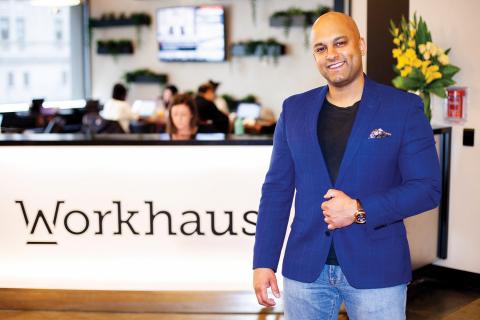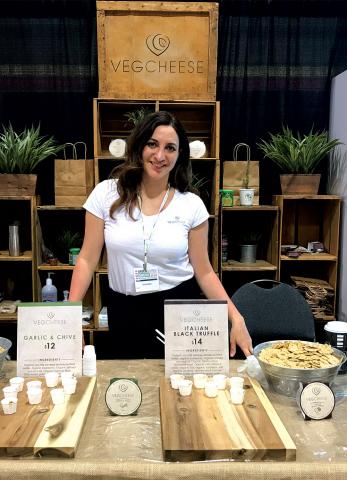StartUps Snapshot

The Gist
After graduating from Commerce in 2014, Jacie deHoop, Ellen Hyslop and Roslyn McLarty, GDA'14, landed corporate jobs in Toronto. Working in a city with so many sports franchises, the three friends quickly noticed how obsessed people were with teams, players and last night’s scores.
“When the Toronto Raptors, Leafs or the Jays are doing well, there’s this kind of energy, and people really unite around it,” deHoop says. But they noticed something else, too: Many women, including themselves, often felt left out of sports talk. As deHoop puts it: “Sports can really feel like a boys’ club.”
So they created The Gist, a sports news outlet with content created by women, for women. It was inspired by other female-targeted sites, like TheSkimm and Girlboss. Smith Magazine recently spoke with deHoop about The Gist, how it got started and what’s next.
How did you start The Gist?
We were all working full time when we observed this imbalance in our professional and personal lives when it came to sports. We wanted to create a female voice in sport that was specifically for a female audience. To see if it was something women would be interested in, we soft-launched an e-newsletter at the end of 2017 that gives you ‘the gist’ of what’s going on in the sports world in a fun, quick read. It was sent every Monday to mostly friends and colleagues. After six months, we applied to the Digital News Innovation Challenge, an incubator. It came with $100,000 in non-dilutive funding and $50,000 in Facebook and Instagram ad coupons, other resources and support. We were one of five teams across Canada accepted. It was the catalyst for all three of us to leave our corporate jobs and take The Gist full time.
Your main product is a twice-weekly newsletter. What other content do you feature?
Our newsletter covers what’s happening in the top professional sports leagues while also highlighting female athletes and women behind the scenes. Only four per cent of sports media coverage is on female athletes. We're trying to change that. We want our readers to feel empowered and confident in their sports knowledge, and, for more casual fans, to ignite a passion for sport. We’re also on all social media, with daily updates on Instagram and Twitter.
What are some additional features of The Gist?
We’re moving into video content and recently did interviews with some awesome athletes – from Shelina Zadorsky of the Canadian women’s soccer team to Thomas Chabot of the Ottawa Senators. We also have deep-dive features on various topics: motherhood and maternity leave in sport, the 'Take a Knee' movement or the Larry Nassar scandal. For more casual fans, we have sport-specific guides, glossaries and FAQs on our site.
In addition, we host sports experiences. What’s so amazing about sport is the community aspect and the gamification behind it, including pools, brackets and fantasy drafts. These are predominantly hosted online, but we also bring our community together offline, through viewing parties. We host viewing events around once a quarter and they’ve helped us create a really engaged community of women around sport.
Are all three of you big sports fans?
Ellen is definitely the really avid fan. Her depth and breadth of knowledge is impressive. While Roslyn and I grew up playing a lot of sports, becoming a really avid fan of any pro sport didn’t happen, likely because sports media today is largely created by men, for the male fan. What we found is that when you’re getting the updates from one of your best friends, it resonates so much more. So we emulated that effect with The Gist. Ellen is kind of the voice of The Gist and leads all of our content strategy.
What areas of the business do you and Roslyn concentrate on?
Roslyn is a CPA and CA and she manages our finances, operations, data and analytics. She ensures we’re moving forward efficiently and keeps all of us on track. I lead all things growth. This includes growing our user base and growth in partnerships.
You started The Gist in Toronto but recently expanded to Ottawa, with more coverage of sports in that area. What’s next for your company?
Our vision is for The Gist to be that go-to source for sports for women across North America. With that, we are expanding our content delivery channels to incorporate video and audio so that our “Gisters” can consume The Gist how they want, when they want. We are also expanding to the U.S. within the year and are evaluating both New York City and Boston as key potential markets to enter next. Our main focus is on growing The Gist community so that we can engage the millions of underserved female fans out there.

Workhaus
One day in June five years ago, Adrian Joaquin went hunting for, of all things, a desk. Joaquin, a chiropractor turned entrepreneur from Toronto, had till then been toiling day and night to launch his own business, a health-care startup. But when things didn’t work out, Joaquin thought about what to do next. Maybe consulting. Or another new venture. Either way, he needed a place to start. That’s where the desk came in.
“What I really wanted was a place to figure out my next move,” he says. “I wanted to rent a desk, a shared space. I was looking for something that was professional enough that I could bring clients there, but that was social, so I could develop a network.” Joaquin scoured Toronto for just such a spot. No luck. Every place he checked out was either too corporate or too casual.
Joaquin was mystified. Surely other people were looking for the same kind of shared office space he had in mind. Maybe, Joaquin thought, he should open such a place. Maybe this was his next move. Workhaus was born.
Mimosa Monday
Workhaus is not your typical office-for-rent. Rather it’s a “co-working space” whose users range from small startups looking to grow, to Fortune 500 companies in need of temporary extra room. Workhaus calls its users “members” and they can rent a desk or various-sized private offices. There’s also a hot-desk option – no reserved seat but access to Workhaus’ open-concept, coffee-shop-style lounges. Members get everything they need to run their business: Wi-Fi, mailing address, boardroom space, printing, coffee and someone at the front desk to greet clients.
Joaquin opened the first Workhaus in an 8,000-square-foot office near Toronto’s St. Lawrence Market in January 2015. Two years later a second location was added. Today, there are eight Workhaus spaces in Toronto, one in Calgary and one in Kitchener-Waterloo in Ontario. All in all, the company oversees 200,000 square feet of office space.
Workhaus is home to some 300 companies. They range in size from one-person outfits to teams of 50 to 100 people or more. The average company has four to five people. Workhaus itself employs around 20. Joaquin, who earned his Executive MBA Americas degree (a partnership between Queen’s and Cornell University) in 2012, is the CEO.
So why do firms use Workhaus? Flexibility is a big reason. Workhaus offers month-to-month leases rather than years-long rental commitments. “If you’re a startup in the early stages, you don’t know how fast or not you’re going to grow,” says Joaquin. “We offer that ability to grow with you. We have one company with us that started with one person at one desk four years ago; now he’s scaled up to 30 people with a few offices in our space.” Corporations, meanwhile, sometimes require extra space for teams working on projects. “They may only need to be there 18 to 24 months. Well, in Toronto you can’t get a lease for that; leases are five to 10 years.”
Another appeal is a community atmosphere – something Workhaus deliberately cultivates. One way is through fun events (a mini-putt social and “Mimosa Monday” were recently held) and workplace education sessions with titles like “Fundraising 101 for Entrepreneurs” and “JavaScript Coding for Beginners.”
That club feel
Tellingly, Joaquin does not consider Workhaus to be a real estate company. “We’re a hospitality company,” he says. Each Workhaus location employs a community manager who, in addition to day-to-day operations duties, is like a ship’s cruise director, organizing events and ensuring Workhaus members connect with one another.
To further encourage people to meet, Workhaus designs each location around a lounge. Members must walk through it to get to their office, says Joaquin, and these lounges are often bustling spots full of coffee and conversation. “You can rent space anywhere. But if you have 20 friends around you where you rent a desk, you’re less likely to leave. We like to have that member/club feel.”
That strategy seems to be working. Four more Workhaus locations are set to open over the next six months in Toronto, and Joaquin expects to double his own number of employees to 40.
Joaquin and a business partner have, to date, grown Workhaus themselves, without help from angel investors and the like.
One interesting thing Joaquin has noticed about Workhaus’ business model is that it seems to do well in any economy. In booming Toronto, where downtown commercial vacancy rates are around two per cent, Workhaus space is near capacity. In oil-bust Calgary’s core, where Workhaus opened this year, and where the vacancy rate is around 30 per cent, Joaquin says “we’re getting lots of interest because of the flexibility we have for businesses.”

VegCheese
Lori Sroujian never intended to leave the corporate world to start her own company – let alone a vegan cheese company. But that’s what she did.
Three years ago, Sroujian’s father had a stroke. That caused her tight-knit family to reconsider what they ate. Sroujian stopped eating animal products – including dairy. No easy feat for a self-professed cheese aficionado.
Thus began her search for the perfect non-dairy cheese. Sroujian wanted to find a faux-cheese that could hold its own on a cheeseboard and melt into dishes. But her hunt came up short. “I couldn’t find a product with the taste, texture and ‘melty-ness’ that I expect from my cheese. I decided to start experimenting in my condo kitchen…to find a recipe that would work.”
At the time, Sroujian was director of digital and multichannel marketing at Janssen Pharmaceutical in Toronto. On evenings and weekends, she made batch after batch of vegan cheese. After many failed attempts, she finally landed on a recipe that made her no longer miss the real thing.
Soon, Sroujian was sharing her creation with family and friends. They all loved it. Even the meat eaters. Then someone asked Sroujian whether she was willing to sell some of her cheese. “I didn’t know how to respond,” Sroujian says. “I was like…maybe I need to start a company.”
A brainstorming session with her family led to the name VegCheese (her brother’s idea). To build on her original mozzarella, Sroujian created new flavours, including Italian Black Truffle.
Then she took a chance. She signed up to exhibit at Mississauga VegFest, a vegan consumer show near her home in Toronto. Trouble was, Sroujian had nowhere to make the hundreds of cheeses she’d need for the show. She hadn’t even finalized the packaging for VegCheese yet. Quickly, she rented a commercial kitchen, got her food handling certificate and got busy making cheese. The response at VegFest was overwhelming. “We sold almost 300 cheeses in a day. It was crazy,” she recalls. Social media started talking, too. People wanted to know where they could buy VegCheese.
Lori Sroujian has long had an entrepreneurial spirit. Her thirst for the next challenge is what drew her from traditional marketing to digital, and led her to earn her MBA at Smith. So when Janssen restructured her department last October, she took it as a sign to pursue VegCheese full time.
Her timing couldn’t have been better. A recent Nielsen survey found that, in North America, consumers are trying to incorporate more plant-based foods into their diets (39 per cent of Americans and 43 per cent of Canadians). Nearly half of Canadians (46 per cent) and more than a third of Americans (38 per cent) associate plant-based protein with good health effects.
VegCheese’s line of artisanal vegan cheese is dairy-free, nut-free and gluten-free. It’s handcrafted in Toronto in small batches, with a base of organic soy milk and organic coconut oil.
Last December, Sroujian pitched VegCheese to a jury of experienced businesspeople at UPstart. The competition, led by Queen’s Venture Network, offers funding to budding entrepreneurs – and Sroujian walked away with $15,000. She’s using the money for kitchen equipment and packaging. She also hired a consultant to help extend the fridge life of VegCheese and streamline manufacturing.
VegCheese is now available in 10 specialty food stores in Ontario. Sroujian aims to get it into more stores and into restaurants. As VegCheese grows, Sroujian says she will insist on maintaining the high product standards that she started with. “If I can’t feed it to my family, I will not feed it to my customers. I want to stand behind the quality of what we’re creating.”
